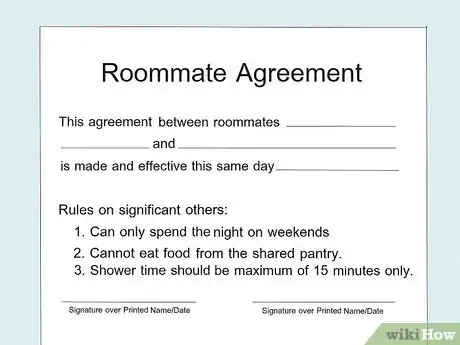This article was co-authored by Kelli Miller, LCSW, MSW and by wikiHow staff writer, Hannah Madden. Kelli Miller is a Psychotherapist based in Los Angeles, California. Kelli specializes in individual and couples therapy focusing on relationships, depression, anxiety, sexuality, communication, parenting, and more. Kelli also facilitates groups for those struggling with alcohol and drug addiction as well as anger management groups. She is the author of “Professor Kelli’s Guide to Finding a Husband” and the award-winning and best-selling book “Thriving with ADHD”. Kelli co-hosted an advice show on LA Talk Radio and is a relationship expert for The Examiner. She received her MSW (Masters of Social Work) from the University of Pennsylvania and a BA in Sociology/Health from the University of Florida.
There are 8 references cited in this article, which can be found at the bottom of the page.
This article has been viewed 22,424 times.
Is your roommate’s boyfriend over so often it feels like you have a third roommate? Having someone else in your space can be annoying, especially when they’re not paying rent. Fortunately, by talking to your roommate you can set clear boundaries and work on a solution. Read through this article for a comprehensive list of tips that you can use when talking to your roommate about how often their boyfriend is over.
Steps
Expert Q&A
-
QuestionWhy do boundaries matter?
 Kelli Miller, LCSW, MSWKelli Miller is a Psychotherapist based in Los Angeles, California. Kelli specializes in individual and couples therapy focusing on relationships, depression, anxiety, sexuality, communication, parenting, and more. Kelli also facilitates groups for those struggling with alcohol and drug addiction as well as anger management groups. She is the author of “Professor Kelli’s Guide to Finding a Husband” and the award-winning and best-selling book “Thriving with ADHD”. Kelli co-hosted an advice show on LA Talk Radio and is a relationship expert for The Examiner. She received her MSW (Masters of Social Work) from the University of Pennsylvania and a BA in Sociology/Health from the University of Florida.
Kelli Miller, LCSW, MSWKelli Miller is a Psychotherapist based in Los Angeles, California. Kelli specializes in individual and couples therapy focusing on relationships, depression, anxiety, sexuality, communication, parenting, and more. Kelli also facilitates groups for those struggling with alcohol and drug addiction as well as anger management groups. She is the author of “Professor Kelli’s Guide to Finding a Husband” and the award-winning and best-selling book “Thriving with ADHD”. Kelli co-hosted an advice show on LA Talk Radio and is a relationship expert for The Examiner. She received her MSW (Masters of Social Work) from the University of Pennsylvania and a BA in Sociology/Health from the University of Florida.
Psychotherapist Having boundaries helps prevent resentment in a given relationship! It's so important to know your own personal boundaries, and also to have boundaries within a relationship. Everyone has different needs and experiences, and it's really important to communicate those clearly.
Having boundaries helps prevent resentment in a given relationship! It's so important to know your own personal boundaries, and also to have boundaries within a relationship. Everyone has different needs and experiences, and it's really important to communicate those clearly.
References
- ↑ https://www.cnbc.com/2018/09/21/5-ways-to-deal-with-a-bad-roommate-.html
- ↑ Kelli Miller, LCSW, MSW. Psychotherapist. Expert Interview. 11 June 2020.
- ↑ https://www.washoeschools.net/cms/lib/NV01912265/Centricity/Domain/176/2.3_I%20Statements.pdf
- ↑ https://mhanational.org/how-deal-roommate-problems
- ↑ https://mhanational.org/how-deal-roommate-problems
- ↑ Kelli Miller, LCSW, MSW. Psychotherapist. Expert Interview. 11 June 2020.
- ↑ https://www.bumc.bu.edu/facdev-medicine/files/2016/10/Active-Listening-Handout.pdf
- ↑ Kelli Miller, LCSW, MSW. Psychotherapist. Expert Interview. 11 June 2020.
- ↑ https://mhanational.org/how-deal-roommate-problems
- ↑ https://www.architecturaldigest.com/story/roommate-probems-your-roommates-boyfriend
- ↑ https://www.forbes.com/sites/jonbittner/2011/08/16/how-much-to-charge-your-roommates-girlfriend/?sh=46f11ba67ca9
- ↑ https://www.cnbc.com/2018/09/21/5-ways-to-deal-with-a-bad-roommate-.html
- ↑ https://www.bsu.edu/campuslife/housing/apply-for-housing/roommates
- ↑ https://www.cnbc.com/2018/09/21/5-ways-to-deal-with-a-bad-roommate-.html







































































Medical Disclaimer
The content of this article is not intended to be a substitute for professional medical advice, examination, diagnosis, or treatment. You should always contact your doctor or other qualified healthcare professional before starting, changing, or stopping any kind of health treatment.
Read More...